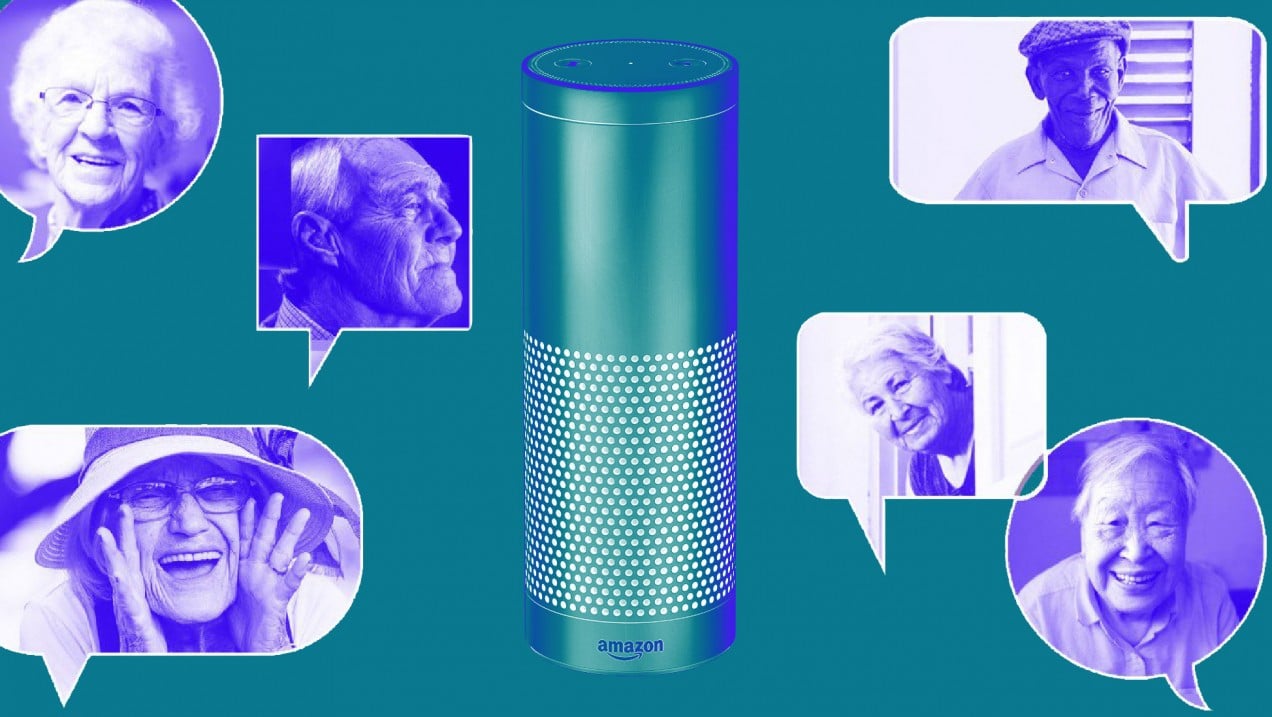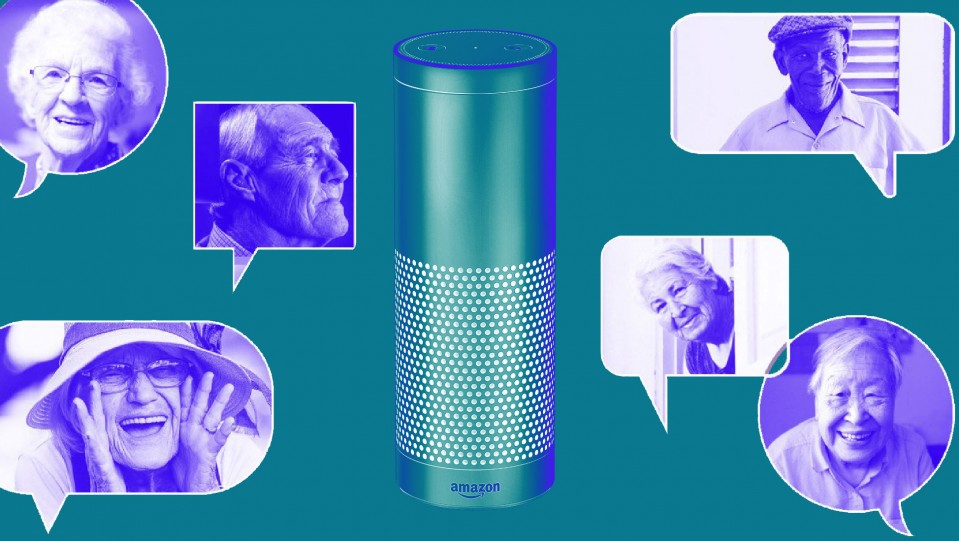

Humans and Technology
Alexa will be your best friend when you’re older
From friendly personal assistant to companion to … spouse?

Leslie Miller’s days are jam-packed. Being legally blind hasn’t slowed down the 70-year-old resident of Casa de Mañana Retirement Community in La Jolla, California: she frequently gets lunches with friends, goes dancing, reads, and loves to listen to radio soap operas. Lately, she’s gotten into guided meditation.
None of that would be possible without Alexa.
“I just love Alexa,” Miller gushed recently. “She’s been a real life-changer.”
Miller is one of a booming group of older adults who have become enthusiastic consumers of voice technology. Pop culture may be enamored with a stereotypical idea of older people struggling to use gadgets, but it’s a demographic that’s excited to use voice tech in their daily lives.
It’s also a potentially huge market—in the United States, 4,600 people turn 65 every day.
But the idea that the age group is tech-averse is a myth attributable to the technology industry’s penchant for fetishizing youth, says Derek Holt, the president and chief operating officer of K4Connect, a technology company focused on seniors.
“Twenty-, 30-, and 40-year-olds are building things for 20-, 30-, and 40-year-olds,” Holt says. “The misconception is that seniors don’t like tech. But they actually do. They just have a different set of features they are interested in.”
Voice tech devices tick a number of boxes that appeal to a wide variety of age groups: they’re easy to use and are physically unobtrusive, and their interactivity can be fun.
Miller recounted how she got her Alexa a few years ago, after she met a fellow Casa de Mañana resident who liked his. He noticed that Miller was curious; that Christmas, Miller received a package with an Echo Dot.
That’s when she joined Front Porch, a conglomerate of nonprofits that’s partnered with a group of retirement communities in Southern California. In 2017, Front Porch began integrating Amazon’s Alexa-powered devices into the Carlsbad by the Sea retirement community in the area; by the end of this year, the project will have expanded to seven other retirement communities and the homes of more than 350 seniors.
“We want to meaningfully impact the lives of older adults,” Davis Park, the project’s executive director, says. Park notes that the voice assistants have been incredibly helpful for those, like Miller, with poor vision, and the project has experimented with using Alexa to help people with dementia know where they are if they are confused about their surroundings.
Miller, like most of her fellow residents, finds her Echo Dot helpful for everyday tasks: What’s the weather? Remind me of a lunch with so-and-so. What’s the definition of this word?
That last question is especially powerful for her. A voracious reader, Miller reads Braille but sometimes wants to know what a word means. Dictionaries are often not available in Braille, and she’d rather not bother other people with such requests. Alexa has restored her sense of independence. “I must use her eight to 10 times a day,” she says.
Her? I ask. She laughs. “I know she’s an inanimate object!” she says. “But I’m attached, and I just laugh at myself. She’s an inanimate object just sitting there, but I talk to her so much.”
Private conversations
Last November, Jeroen Vonk, a designer working with the Dutch government, was tasked with making information on the Netherlands’ national insurance—which distributes the country’s Social Security–like pension funds—more accessible to the country’s 3.5 million clients.
Vonk launched an ambitious plan to distribute Google’s voice technology, Google Home, to older adults in the country (Amazon Alexa is currently unavailable in the Netherlands). He found 266 potential participants for a pilot study, then narrowed that down to 20 people, who then received the devices this past spring.
After two weeks, the results were clear: the older people loved it. The Dutch pension system changes its benefits from year to year, and pays out differently on the basis of birth year. Vonk says users were not only figuring out how to get their pension, but also became friendly with their new assistants.
“They [older adults] find out when they get pensions, what day they get it, that kind of thing,” Vonk says. “It’s about convenience, and they like that they can talk to a robot 24/7 and ask questions. But they also say they have a new friend at home. In the morning they get up and say good morning, and when they go to bed, they say good night. Nobody wanted to give it back.”
That’s not to say that the voice assistants are perfect. One-third of the participants in Vonk’s experiment found that, as he puts it, “speech understanding was not working so good all the time.”
“Sometimes Google Home would turn on [when participants didn’t want it on], or sometimes people ask ‘How is the weather?’ but it responds with other things,” he says.
“I’ve found Alexa is like Jeopardy! You have to command and ask correctly or it doesn’t work,” says Lisa Cini, an interior designer who has been working in senior living centers for 25 years. “I’ve put sticky notes next to Alexa on how to ask questions right, which defeats the purpose.”
Then there’s the question of privacy. Miller says she’s familiar with the voice assistant privacy debate, and she’s noticed her Echo Dot light up sometimes if she’s not talking. So she follows a maxim: “Do not tell Alexa anything you do not want the world to know.”
Me and my Echo
But as Vonk says, as often as not the seniors he’s worked with spend a lot of time with Alexa just chatting.
“A lot of people say, ‘I’m not lonely, I have lots of things to do,’” he says. “But they go home and they’re all alone. They say, ‘It doesn’t matter who it is. I just want to talk to someone.’”
Kari Olson, the chief innovation and technology officer at Front Porch, said at first her team worried about this kind of behavior. Would swapping real human interaction for talking to a know-it-all voice assistant isolate people?
It’s an urgent concern. Loneliness has been linked to a higher likelihood of depression and anxiety, as well as increased risk of heart attack, stroke, and death. In a study this year, the National Poll on Healthy Aging found that one-third of seniors experienced loneliness, or a lack of companionship; another third felt they didn’t have enough social contact with others.
When the results of Front Porch’s 2017 study came in, Olson and her colleagues’ fears were allayed. “Seventy-one percent of those who participated felt closer to their family and community,” she says. “It’s critically important. With Alexa, [seniors] see much greater engagement and delight. It’s not a silver bullet, but it’s certainly an incredible tool.”
Because of this, the Dutch government and organizations like Front Porch have come to believe that compromising on privacy is a small price to pay in the name of health. Vonk says that one of the most popular requests he fields from older people is renaming their Google Home so they don’t have to start every command with “Okay, Google.”
“They say, ‘It’s my friend, and I want to give it a name,” he says. “That’s what people really want.”
Mary van Vught, part of Vonk’s survey, echoes the sentiment. When asked if she saw Google Home as a friend, she says no, but adds, “Perhaps if you can change the ‘Hey, Google’ into another name and give it the voice of a butler?” She also says, wryly, that her favorite memory of Google Home was asking it to marry her, and wondered if it was possible for the assistant to have a “male voice with another answer.”
Miller also says she knows very well that Alexa is not her friend, but an “aide.” Alexa has opened up Miller’s world, though. And for that, she is grateful. “Television is pretty crummy,” she says. “She is better entertainment.”
Advertisement